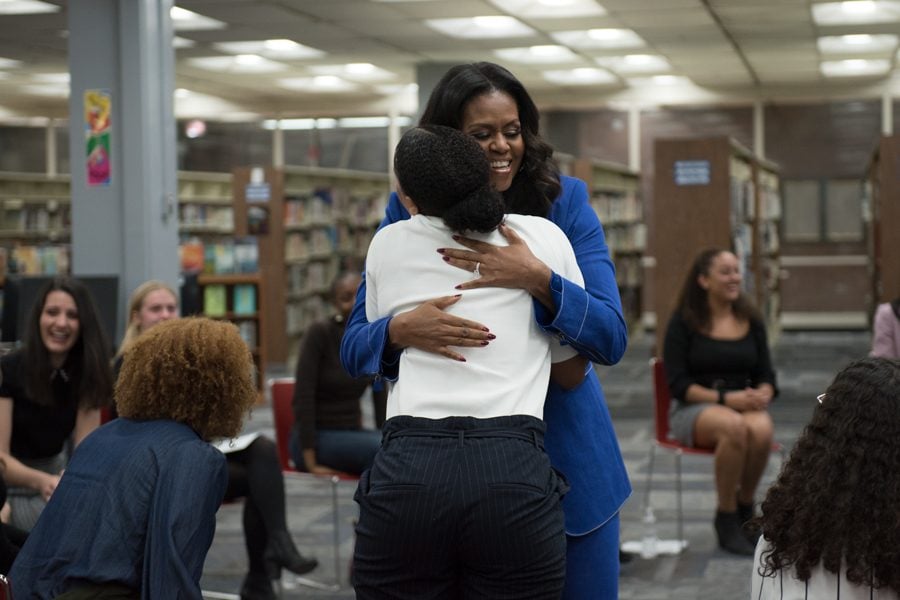Ahead of book release, Michelle Obama tells students to find their stories, use their voices
Kristina Karisch/Daily Senior Staffer
Former first lady Michelle Obama hugs a student at Whitney Young Magnet High School. Obama visited her alma mater Monday in advance of her book tour.
November 13, 2018
CHICAGO — Before kicking off her much-anticipated book tour, former first lady Michelle Obama stopped by her alma mater to chat with high school students and share her key message: finding one’s story and voice in the world.
“It’s the essence of who you are,” Obama told a group of 20 Whitney M. Young Magnet High School seniors, all girls, on Monday. “All the blemishes and all the triumphs and all that makes you special. … You don’t think it’s special, but it is, and all your stories are special.”
Obama, who graduated from the Chicago school in 1981, was salutatorian and her class treasurer. In her new memoir, “Becoming,” which is set for release on Tuesday, the former first lady chronicles her life, from childhood to the White House.
She will be starting her book tour Tuesday at the United Center, where she will be interviewed by Oprah Winfrey.
“Coming to Whitney Young was my first transition out of my sameness, out of my comfort zone,” Obama said. “And then on to college, and then on to Boston and on and on. And every step I took was pushing me out of my comfort zone. Now I realize that is a rare thing; it’s a luxury for us to have the ability to move out of our comfort zone.”
Many of the students — who had been given excerpts of Obama’s book — said they related to Obama and that they saw their own stories and insecurities reflected in her work. They spoke about the welcoming nature of Whitney Young and how they are concerned they won’t find a similar environment in college.
Some students mentioned how they have felt discouraged because of their backgrounds, and that they worry about telling their own stories and having to educate others on issues of diversity and disparity.
In her book, Obama writes that when she went to college at Princeton, she felt that the “burden of assimilation is put largely on the shoulders of minority students.”
“This is doable, of course — minority and underprivileged students rise to the challenge all the time — but it takes energy,” Obama writes. “It takes energy to be the only black person in a lecture hall or one of a few non-white people trying out for a play or joining an intramural team. It requires effort, an extra level of confidence, to speak in those settings and own your presence in the room.”
A handful of students currently in the process of applying to college shared fears about not being able to measure up in applications. Others, they said, have access to SAT and ACT tutoring and can pad their resumes with impressive extracurriculars because they don’t have to work a job after school.
Obama acknowledged that even today, people are often measured by their “stats, and not their story” — especially with policies like legacy admissions that can favor candidates from more privileged backgrounds.
“You think there are certain voices that are more important than others. They look a certain way, they have a certain title,” she said. “As you grow up, you’ll understand how arbitrary stats are … and you’ll start to see, just because you’re sitting with the title, doesn’t mean that you actually know anything.”
Her core message to students was straightforward: Everyone has a story worth sharing, even if it doesn’t seem to “fit” with the mainstream narrative.
“(Your) story, with all the highs and lows and what seems so ordinary and what seems like nothing to you, is your power,” Obama said. “That is your gift.”
Email: karisch@u.northwestern.edu
Twitter: @kristinakarisch



